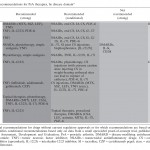The Rheumatology Research Foundation recently received its seventh consecutive four-star rating from Charity Navigator. This prestigious, highest rating possible is based on good governance, sound fiscal management and commitment to accountability and transparency. As the nonprofit sector continues to grow at an unprecedented pace, savvy donors are demanding more accountability, transparency and quantifiable results from…






